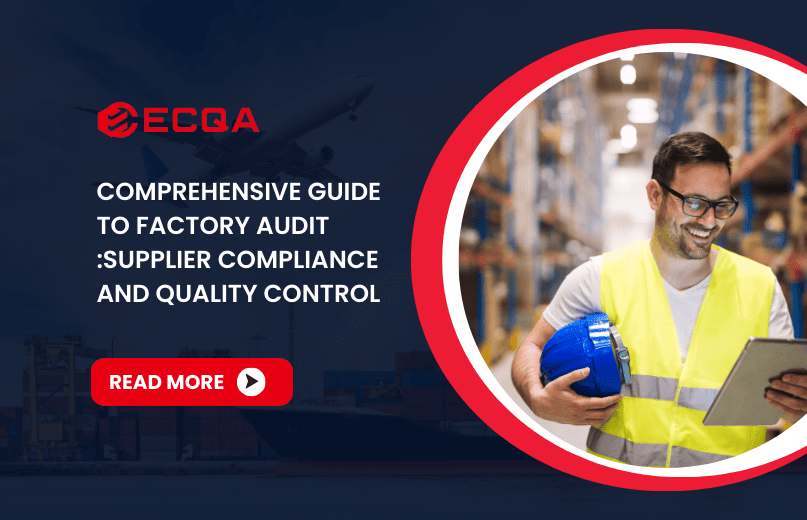
Comprehensive Guide to Factory Audit :Supplier Compliance and Quality Control
A factory audit is a systematic on-site evaluation of a manufacturer’s operations, processes, and compliance with international standards. It is a critical tool for global buyers and importers who rely on overseas suppliers, particularly in manufacturing hubs such as China, Southeast Asia, and South Asia. Conducting audits ensures that a supplier is capable of producing goods that meet required quality, safety, ethical, and environmental expectations.

When audits are skipped, companies expose themselves to serious risks. These include product defects, regulatory non-compliance, labor violations, and even reputational damage in the consumer market. In today’s complex global supply chain, a factory audit is not a formality but a necessity for safeguarding product quality and ensuring compliance across all operational levels.
Four Types of Factory Audits
Different types of factory audits address specific dimensions of a supplier’s operations. Buyers often commission multiple audit types depending on their industry, target market, and compliance requirements.
Quality Management System Audit
A Quality Management System (QMS) Audit evaluates whether a factory’s processes align with internationally recognized standards such as ISO 9001. Auditors review documentation, production workflows, and capacity planning. They also assess quality control (QC) procedures, in-house testing labs, and staff training programs. This audit provides a clear picture of how consistently a factory can deliver products that meet specifications.
Social Compliance Audit
A Social Compliance Audit examines working conditions, employee welfare, and labor rights within the factory. Standards such as SMETA (Sedex Members Ethical Trade Audit), SA8000, and BSCI are widely recognized in the global marketplace. Auditors verify wages, working hours, health and safety measures, and freedom of association. For brands in sectors such as textiles, toys, and consumer goods, social compliance audits are often mandatory to meet retailer requirements.
Environmental Audit
An Environmental Audit focuses on sustainability practices, resource management, and pollution control. Frameworks such as ISO 14001 provide guidance for assessing environmental management systems. Buyers are increasingly demanding proof of responsible waste disposal, emissions control, and energy efficiency initiatives. This type of audit is crucial for suppliers producing goods that may impact environmental footprints.
Security Audit
A Security Audit ensures that factories implement adequate measures to protect products and raw materials from theft, tampering, or terrorism. Standards like C-TPAT (Customs-Trade Partnership Against Terrorism) and ISO 28000 cover areas such as cargo handling, access controls, and facility security. This is particularly relevant for industries supplying sensitive goods such as electronics, pharmaceuticals, or food packaging.
Key Elements Checked in a Factory Audit
A well-structured audit covers every aspect of a manufacturer’s operations. The following elements are typically reviewed in detail:
Factory Profile and Legal Documents
Auditors verify business licenses, registration records, certifications, and compliance with local regulations. This step ensures that the supplier is legally operating and not involved in fraudulent practices such as subcontracting to unauthorized facilities.
Production Capacity and Equipment
A factory’s ability to meet order volumes is closely tied to its machinery, technology, and production line capacity. Audits assess whether the equipment is modern, well-maintained, and capable of scaling production without compromising quality.
Quality Control Processes
A strong QC system is essential for minimizing defects and ensuring consistency. Auditors examine incoming raw material checks, in-process inspections, and final product testing. They also review whether in-house laboratories follow recognized testing standards.
Workforce Conditions and Policies
Labor rights and employee welfare form a central component of modern supply chain responsibility. Auditors evaluate contracts, attendance records, overtime practices, and grievance mechanisms. Poor workforce conditions can lead to reputational risks and supply chain disruptions.
Supply Chain Traceability
Material sourcing and traceability are especially important in sectors such as textiles, electronics, and food packaging. Auditors examine supplier lists, sourcing policies, and documentation to confirm that materials are compliant with relevant regulations, such as GRS (Global Recycled Standard) or FSC (Forest Stewardship Council).
Health, Safety, and Environmental Compliance
Auditors review safety protocols, protective equipment, waste management systems, and emergency preparedness. Factories with weak safety practices expose buyers to legal liabilities and brand damage if accidents occur.
Benefits of Factory Audits for Buyers
The value of factory audits extends beyond compliance. They provide strategic benefits that directly impact a company’s bottom line and reputation.
Ensuring International Standards Compliance
Factory audits confirm whether a supplier meets global benchmarks such as ISO, CE, RoHS, or REACH. Compliance is critical for importers to avoid customs delays, recalls, or penalties in target markets.
Reducing Risks of Substandard Products
By identifying weaknesses in production or QC systems early, audits prevent costly product failures and customer complaints. This is particularly vital for industries where safety is non-negotiable, such as children’s toys, medical devices, or electrical appliances.
Building Trust and Transparency
Audits create a culture of transparency between buyers and suppliers. Reliable reporting builds confidence that both parties share aligned values regarding quality and responsibility.
Supporting Regulatory Compliance
Governments and trade blocs, including the EU, US, and Middle Eastern authorities, enforce strict regulations on imports. Factory audits give buyers documented proof of compliance, simplifying customs clearance and market access.
Strengthening Long-Term Supplier Relationships
Consistent audits encourage suppliers to improve operations over time. This strengthens long-term relationships, reduces turnover of unreliable vendors, and helps buyers secure stable, high-quality production partners.
How to Conduct a Factory Audit
The process of conducting a factory audit follows a structured sequence to ensure accuracy and reliability.
Step 1: Decide Audit Type
Identify whether you need a quality audit, social compliance audit, environmental audit, or a combination. The choice depends on your industry, product type, and destination market regulations.
Step 2: Appoint a Third-Party Inspection Company
Independent, accredited third-party providers are critical for impartial results. Companies such as ECQA specialize in conducting audits across multiple regions, ensuring global buyers receive objective and standardized evaluations.
Step 3: Prepare Audit Checklist and Requirements
Before the audit, buyers provide auditors with a checklist tailored to specific compliance requirements. This may include references to ISO standards, retailer codes of conduct, or brand-specific criteria.
Step 4: On-Site Inspection and Interviews
Auditors conduct on-site visits, review documentation, tour production lines, and interview employees. These steps reveal both documented policies and actual practices inside the factory.
Step 5: Audit Report and Corrective Action Plan
After completion, auditors issue a detailed report outlining findings, strengths, weaknesses, and non-conformities. Factories that fail specific requirements are expected to submit a corrective action plan (CAP).
Step 6: Follow-Up and Continuous Monitoring
Corrective actions are followed up through re-audits or documentation reviews. Continuous monitoring ensures that compliance is not a one-time exercise but an ongoing commitment.
Common Challenges in Factory Audits
Despite their importance, factory audits are not without challenges. Buyers should anticipate the following issues:
Incomplete or Falsified Documents
Factories may present falsified records, such as altered payroll data, to conceal non-compliance. Skilled auditors are trained to detect inconsistencies and cross-check multiple data sources.
Language and Cultural Barriers
Communication can be difficult when factory staff and auditors come from different cultural and linguistic backgrounds. Professional interpreters and experienced auditors help bridge these gaps.
Resistance from Factory Management
Some factory managers may perceive audits as intrusive or threatening. Building trust and explaining the benefits of audits can reduce resistance and improve cooperation.
Time and Cost Constraints
Comprehensive audits require investment in both time and financial resources. However, the long-term savings from avoiding product recalls, fines, or supply disruptions significantly outweigh the upfront costs.
A factory audit is a fundamental requirement for building safe, compliant, and resilient supply chains. It ensures that global buyers work with trustworthy suppliers capable of meeting international standards and customer expectations.
To protect your supply chain, reduce compliance risks, and build stronger supplier partnerships, partner with a trusted third-party inspection company such as ECQA. Independent audits give you the assurance needed to secure sustainable and transparent business operations.

 Request Free Sample Report
Request Free Sample Report